Ideas into movement
Boost TNI's work
50 years. Hundreds of social struggles. Countless ideas turned into movement.
Support us as we celebrate our 50th anniversary in 2024.

Almost 100 days in to Israel’s genocidal war on Palestine, the International Court of Justice (ICJ) convened in the Hague on 11 and 12 January following proceedings brought by the Republic of South Africa against the State of Israel under the 1948 Genocide Convention. The Convention, which places a legal duty on signatories to prevent genocide, has been ratified by both states, giving the Court jurisdiction in the matter.
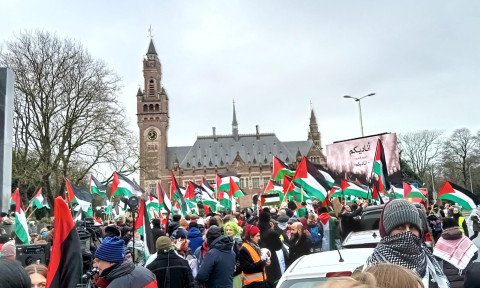
South Africa’s 84 page submission makes a compelling case, in fact and law, that Israel’s actions amount to genocide and calls on the Court to grant provisional measures. The application has been formally endorsed by several states, the Arab League, the Organisation for Islamic Cooperation and over 1500 civil society organisations from around the world. Meanwhile, Israel’s defence has been backed by Germany, while the UK and US denounced the case with the latter claiming it is ‘meritless, counterproductive and completely without any basis in fact whatsoever’.
The Transnational Institute was among those who stood in solidarity with the people of Palestine outside the ICJ on 11 and 12 January. Here we convey the sentiment, energy and challenges expressed by those who gathered in the Hague to mark this historic occasion.
As dawn broke on 11 January, we made our way to the Hague in sub-zero temperatures. When we disembarked at Den Haag Centraal train station we could hear the now familiar free free Palestine refrain that regularly rings out at station sit-ins around the world. The protesters had gathered for the hearing and set out for the iconic 1913 Vredespaleis (Peace Palace), now home to the ICJ.
The symbolism of the occasion was not lost on anyone who had been following the horror in Gaza over the previous three months nor on those struggling against other colonialist and racist systems of oppression. The historical significance was not lost either: South Africa – a nation which had fought and freed itself from decades of apartheid and over a century of British and Dutch colonial rule – had convened the UN’s highest court of justice to hear a case against Israel – a 21st century settler colonial apartheid state embodying what oppressed peoples around the world have struggled against for centuries under European and US colonialism and imperialism.
Although it is Israel that stands accused of genocide, it was as though the court itself were on trial. Amid the deafening silence from the International Criminal Court, the credibility, not only of the ICJ but of the entire international legal system, hung in the balance.
Despite the freezing cold our spirits were high. There was determination, urgency and optimism that the global effort over the previous three months to organise, march and blockade – people power spurred on and inspired by the resistance and resilience of the Palestinian people – had led us here.
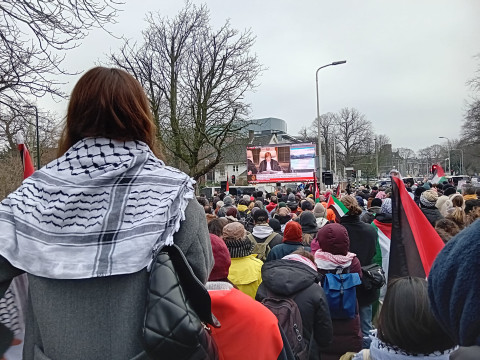
Our protest, which numbered hundreds of people, was positioned at the back and to the side of the Peace Palace where large screens were installed and the court proceedings were broadcast live. We were young, old, black, brown, white, Muslim, Jewish, Arab, Dutch, international, families with children, friends, a community of people loudly proclaiming ‘in our thousands, in our millions we are all Palestinians’. A smaller group of pro-Israel protesters gathered in front of the Court.
South Africa opened by calling out ‘the ongoing Nakba of the Palestinian people through Israel’s colonisation since 1948, which has systematically and forcefully displaced, dispossessed and fragmented the Palestinian people, deliberately denying them their internationally recognised inalienable right to self determination and their … right of return as refugees to their towns and villages in what is now the state of Israel’.
This set the tone. No more business as usual and the world was on notice. The white colonialist centre of power was being shaken, the sands of geopolitics were shifting, and as we stood outside the courthouse, we were a collective witness to this moment.
Throughout the morning the Dutch police for no apparent reason attempted to relocate us away from the screen that had been installed in a designated location precisely for the purpose of us watching it. The crowd was determined however and stayed put refusing to move. Eventually the police gave up.
As we watched South Africa’s lawyers lay out their case conveying the catastrophic reality of the genocide we did so on a split screen where we could simultaneously see live images streaming from Gaza. Irish barrister Blinne Ní Ghralaigh told the court that this was ‘the first genocide in history where its victims are broadcasting their own destruction in real time in the desperate, so far vain hope, that the world might do something’.
Despite the bitter cold, the mood was one of renewed solidarity and determination and when at times the livestream stalled the crowd chanted ‘viva viva intifada’ and ‘revolution is the solution’.
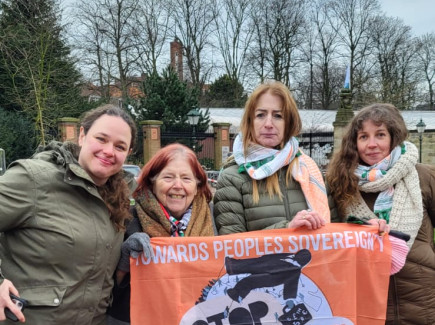
For decades power and politics have aligned to guarantee impunity for Israel in its systematic violation of international law. Even in the face of a genocide unfolding before our eyes this has remained largely unchanged. There are a few exceptions within political realms however and notable dissenting voices that gathered outside the ICJ in support of the Palestinian people included Irish MEPs Clare Daly and Mick Wallace, Spanish MEPs Miguel Urban Crespo and Idoia Villanueva Ruiz, and Belgian MEP Marc Botenga. In the afternoon, the South African delegation emerged from the court and among those who addressed the crowd were South African Minister of Justice, Ronald Lamola, as well as international figures including Jeremy Corbyn and Jean Luc Melenchon.
There was an infectious spirit of solidarity as we departed the Hague that evening and made plans to reconvene the following morning.
The freezing temperatures of the day before had risen to just above zero and so too had the energy of the crowd. We were greater in number and we were located immediately in front of the ICJ with the Court entrance in full view.
As Israel’s representatives began addressing the court and we were subjected to three hours of distortion, lies and propaganda the mood shifted to anger and outrage. At one point eggs were thrown at the screen.
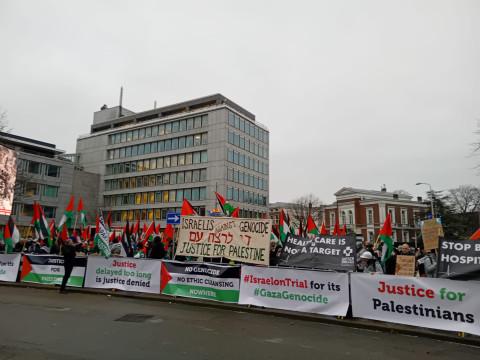
The emotion was much more deeply felt and palpable than the previous day. Heartbroken Palestinian and Arab women wept silently and continuously while others screamed out in sheer desperation for the madness and murder to stop, unable to contain their grief and almost entirely broken by the previous months of horror. One Palestinian woman clutched a baby doll and wept throughout the hearing. It is utterly impossible to fathom what those inside Gaza continue to endure.
In contrast to the South African presentation, which set the genocide within its historical context, the Israeli defence focused almost exclusively on the events of 7 October and their aftermath. The defence amounted to Israel being above international law while equating the South African delegation as the legal arm of Hamas.
At one point Israel’s defence team quoted European Commission President Ursula von der Leyen, to justify its genocidal acts. One may speculate that Frau Genocide, may in fact, be proud of such a legacy though it is a damning indictment that statements by the President of an institution born out of the ashes of the second World War, would now be included by Israel to defence itself against allegations of genocide. We have learned nothing from our past.
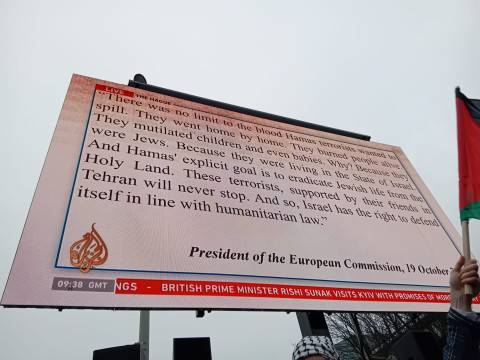
At one point the organisers suggested we might turn off the court proceedings such was outrage in the crowd, though an online poll carried out in real time returned an 89% preference to continue watching.
There was some comic relief when defence lawyer Malcom Shaw struggled to lay out his arguments claiming that his papers had been shuffled and jokes ran through the crowd that Hamas must be responsible. As he continued he coughed and spluttered intermittently leaving us wondering if even he was struggling to swallow Israel’s version of events.
While Al Jazeera broadcast the proceedings live on both days, mainstream media outlets chose only to show Israel’s ‘rebuke’ of South Africa’s allegations. The absurdity of this is comparable to only showing the second half of a football match. In recognition of the coverage by Al Jazeera’s journalists in Gaza, and in acknowledgment of the many journalists who have lost their lives, some protestors carried photos of AJ’s Gaza bureau chief Wael al Dahdouh.
Young, defiant Arab men and women proudly displaying keffiyehs embodied what the organisers may have been referring to when they said loudly from the podium – the establishment has messed with the wrong generation – we will not be silenced! Indeed, as the court proceedings continued to reach new levels of incredulity, a separate sound system was mounted and Arabic revolutionary music was played as crowds sang and danced choosing to ignore the rest of the proceedings entirely.
After the Israeli delegation’s three-hour marathon on how to commit a humanitarian genocide had ended the crowd erupted in applause for Al Jazeera’s chief political analyst Marwan Bishara, who spoke the first words of truth after the bombardment of lies. With that the screen was switched off and speeches were made carrying a message from Gaza that included a global call to action for the next day, a global strike at the end of January, and a call to boycott Israel and those complicit in genocide.
There was immense gratitude for the nation of South Africa and when the delegation emerged from the courthouse on the second day and stood among the protesters they were presented with flowers. There was a notable ease about them, their conscience was clear, they were on the right side of history.
There is little doubt that the ICJ hearing was a moment of history. It is difficult to articulate the depth of the sentiment felt by those who turned out for Palestine and equally difficult to distinguish the most significant moments for there were many, though one thing was for sure – attempts to silence the Palestinian people and marginalise their struggle for self-determination have been shattered. However the ICJ rules, the people have already decided – Israel is guilty of genocide and US and European (western) governments are complicit. It will be a damning indictment of international law if the court does not reach the same conclusion.
Beyond the ICJ, the challenge to us is to read the signs of our times and become part of the major political shift already taking shape as the world responds to the Palestinian people whose voice has been boldly echoed into action around the world and calls out globally for building a new era of struggle and international solidarity.